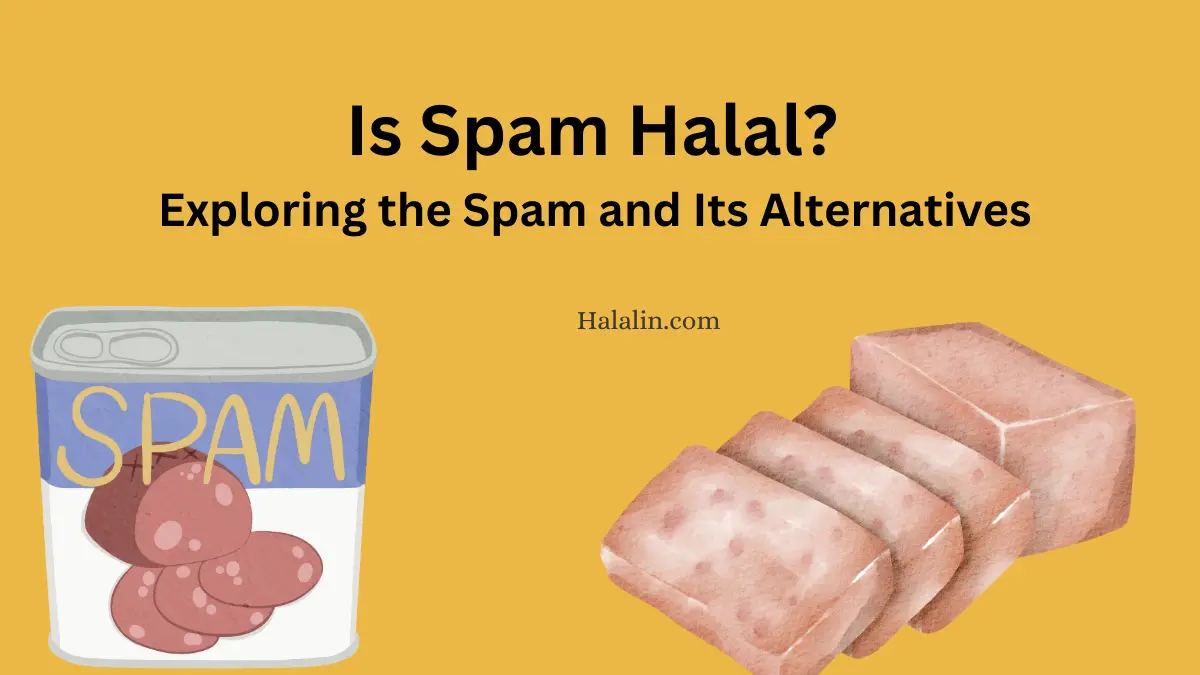Spam is a popular canned meat product known for its convenience and long shelf life. However, for Muslims who adhere to halal dietary laws, the question arises: is Spam halal? In this blog post, we’ll explore the halal status of Spam, discuss halal alternatives, and provide insight into the Islamic perspective on consuming processed meats.
What is Spam?
Spam is a brand of canned cooked pork that has been produced by Hormel Foods Corporation since 1937. It contains a mixture of pork, ham, salt, water, potato starch, sugar, and sodium nitrite. The product is often used in sandwiches, fried dishes, and even in some cultural cuisines worldwide. Its popularity stems from its versatility and long shelf life.
Understanding Halal Dietary Laws
In Islam, halal refers to what is permissible or lawful according to Islamic law, particularly concerning food and drink. For meat to be considered halal, it must meet specific criteria:
- The animal must be slaughtered by a Muslim who recites the name of Allah before the slaughter.
- The animal must be healthy at the time of slaughter.
- The blood must be drained from the veins.
- The meat should not be from an animal considered haram (forbidden), such as pork.
Is Spam Halal?
The straightforward answer is no, Spam is not halal. The primary ingredient in Spam is pork, which is explicitly prohibited (haram) in Islam. Consuming pork or any pork-derived products is forbidden for Muslims, as outlined in the Quran and Hadith.
Know more:
Why is Pork Haram in Islam?
Pork is considered haram due to explicit prohibitions in the Quran. Verses such as Surah Al-Baqarah (2:173), Surah Al-Ma’idah (5:3), Surah Al-An’am (6:145), and Surah An-Nahl (16:115) clearly state that pork is forbidden for consumption. The wisdom behind this prohibition is believed to be for the spiritual, physical, and ethical wellbeing of individuals.
Quranic References:
- Surah Al-Baqarah (2:173):
“He has only forbidden to you dead animals, blood, the flesh of swine, and that which has been dedicated to other than Allah. But whoever is forced [by necessity], neither desiring [it] nor transgressing [its limit], there is no sin upon him. Indeed, Allah is Forgiving and Merciful.” - Surah Al-Ma’idah (5:3):
“Prohibited to you are dead animals, blood, the flesh of swine, and that which has been dedicated to other than Allah, and [those animals] killed by strangling or by a violent blow or by a headlong fall or by the goring of horns, and those from which a wild animal has eaten, except what you [are able to] slaughter [before its death], and those which are sacrificed on stone altars, and [prohibited is] that you seek decision through divining arrows. That is grave disobedience…” - Surah Al-An’am (6:145):
“Say, ‘I do not find within that which was revealed to me [anything] forbidden to one who would eat it unless it be a dead animal or blood spilled out or the flesh of swine – for indeed, it is impure – or it be [that slaughtered in] disobedience, dedicated to other than Allah. But whoever is forced [by necessity], neither desiring [it] nor transgressing [its limit], then indeed, your Lord is Forgiving and Merciful.’” - Surah An-Nahl (16:115):
“He has only forbidden to you dead animals, blood, the flesh of swine, and that which has been dedicated to other than Allah. But whoever is forced [by necessity], neither desiring [it] nor transgressing [its limit], then indeed, Allah is Forgiving and Merciful.”
Hadith References:
- Sahih Bukhari (Book 34, Hadith 3015):
Narrated by Abu Huraira: The Prophet (ﷺ) said, “The eating of donkey meat is forbidden.” This indicates the prohibition of certain animals’ meat in Islam, similar to pork. - Sahih Muslim (Hadith 1941):
The Prophet (ﷺ) said, “Allah has cursed those who drink alcohol, those who pour it, those who sell it, those who buy it, those who press it, those for whom it is pressed, those who carry it and those to whom it is carried.” This hadith reflects the comprehensive approach in Islam to avoiding haram substances. - Sunan Abu Dawood (Hadith 3801):
The Messenger of Allah (ﷺ) said: “The flesh of swine is impure.” This hadith directly reinforces the prohibition of pork.
Halal Alternatives to Spam
For those who enjoy the convenience and taste of Spam but adhere to halal dietary laws, several halal alternatives are available. These products are made from halal-certified meats and are processed in compliance with Islamic guidelines. Some popular halal Spam alternatives include:
- Halal Canned Beef or Chicken: These products offer a similar texture and flavor to Spam but are made from halal-certified meats.
- Turkey-Based Spam Alternatives: Some companies produce turkey-based Spam alternatives that are halal-certified, providing a pork-free option.
- Halal Luncheon Meat: Several brands offer halal luncheon meats that resemble Spam but are made from permissible meats like chicken or beef.
Where to Find Halal Spam Alternatives
Halal Spam alternatives can often be found in halal grocery stores, online marketplaces, and some mainstream supermarkets with a halal section. Always check the packaging for halal certification to ensure that the product meets Islamic dietary requirements.
The Importance of Halal Certification
Halal certification is crucial for Muslims to ensure that the food they consume complies with Islamic law. Products with halal certification have undergone a thorough review process to confirm that all ingredients and processing methods meet halal standards. When purchasing processed meats or any other food products, looking for the halal certification label is essential.
The Role of Intention and Knowledge in Halal Consumption
In Islam, intention (niyyah) plays a significant role in all actions, including food consumption. Muslims are encouraged to seek knowledge about what they consume and ensure it aligns with their faith. Eating halal is not just about following rules; it’s about living a lifestyle that honors one’s spiritual beliefs.
Ethical Considerations in Choosing Halal Alternatives
When selecting halal alternatives to Spam, it’s also important to consider ethical aspects, such as the treatment of animals, sustainability, and fair trade practices. Choosing products from companies that align with these values can enhance the halal experience by incorporating broader ethical considerations into your dietary choices.
10. FAQs About Spam and Halal Alternatives
Q1: Can Muslims eat Spam if it’s made from chicken or beef?
A1: Traditional Spam is made from pork, which is haram. However, if Spam is made from halal-certified chicken or beef, it would be permissible, provided all other halal requirements are met.
Q2: What should I look for in halal-certified canned meats?
A2: Ensure that the product has a reliable halal certification label, and check the ingredients to ensure no haram substances are included.
Q3: Are there any popular brands offering halal Spam alternatives?
A3: Yes, brands like Midamar, Al-Falah, and Crescent Foods offer halal canned meats that can serve as alternatives to Spam.
Q4: Can halal Spam alternatives be used in the same recipes as regular Spam?
A4: Absolutely! Halal Spam alternatives can be used in any recipe that calls for Spam, such as fried rice, sandwiches, or pasta dishes.
Q5: Is it more expensive to buy halal Spam alternatives?
A5: The cost of halal Spam alternatives can vary depending on the brand and region. In some cases, they may be slightly more expensive due to the halal certification process.
Conclusion
While Spam is a popular and convenient food product, it is not halal due to its pork content. However, many halal alternatives are available that provide similar taste and texture without compromising Islamic dietary laws. By choosing halal-certified products, Muslims can enjoy a variety of foods while adhering to their faith’s dietary guidelines.
Whether you’re shopping for a halal alternative to Spam or simply seeking to learn more about halal dietary laws, it’s essential to make informed decisions that align with your values and beliefs. Always check for halal certification and consider the ethical implications of your food choices.

